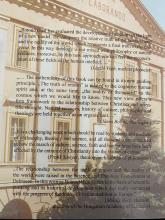Botond Gaál, The Truth of Reason and the Reality of the World: Historic Development of the Exact Sciences from a Christian Viewpoint (Debrecen, Hungary: Böszörményi Jenö Alapítvány Debreceni Református Hittudományi Egyetem, 2002)
Gaál, Botond. The Truth of Reason and the Reality of the World: Historic Development of the Exact Sciences from a Christian Viewpoint. Debrecen, Hungary: Böszörményi Jenö Alapítvány Debreceni Református Hittudományi Egyetem, 2002
Title page verso: Translated by Jusztina Nagy-Jánossy. Reviewed by Frank Sawyer.
Dedication: "To my dear wife Mária and our three children Gerzson, Botond and Veronika."
Dedication page verso:
"This translation was supported by a grant from the Science and Religion Course Program in Europe of the Center for Theology and Natural Sciences (CTNS) in Berkeley, California, funded by the John Templeton Foundation. The publisher and sponsor of this book is the "Foundation for the memory of Reverend Jenö Böszörményi and his wife." This Foundation was established in 1995 by Mrs. Georges Lainé [Márta Böszörményi], the daughter of Reverend Jenö Böszörményi, in order to promote the publications of the Debrecen University of Reformed Theology. This publication was also sponsored by the Regional Center of the Hungarian Academy of Sciences in Debrecen."
- Preface
- Introduction, p. 1
- Roots of Exact Sciences in Ancient Times, p. 4
- Plato projects reality into heaven, p. 5
- Aristotle: reality equals the truth of the divine part of mind, p. 10
- Stoics talk about the "soul of the universe," p. 14
- Philo dissolves man in divinity, p. 17
- Rise and decline in Greek mathematics, p. 19
- Intellectualism of the Jews of ancient times, p. 27
- Position of Antique Science in the Strong Centuries of the Roman Empire, p. 37
- The appearance of Christianity, p. 37
- The political framework of Rome, p. 37
- Importance of Alexandria and of east-west religious movement, p. 39
- Fight with gnosticism, p. 40
- Victory over neoplatonism, p. 41
- Fall of Alexandria and the decline of Hellenic culture, p. 43
- The first significant era of Christian thinking, p. 45
- Trinity, a factor influencing views, p. 46
- Creatio ex nihilo, p. 48
- New interpretation of the relationship between truth and reality in Christian thinking, p. 53
- Four important thinkers of the ancient church who contributed to the proper development of exact sciences through their cosmology, p. 57
- Contingent approach and the order of the world, p. 61
- From Ptolemy to Copernicus, p. 67
- Ptolemy "saved the phenomena," p. 68
- The teleological theology of Augustine, p. 69
- Did Thomas Aquinas succeed in bringing about the great synthesis? p. 71
- The turn by Copernicus, p. 73
- External Means of the Initial Development of Science in Greco-Roman Culture, p. 75
- Technical level, p. 75
- Evolution and effects of writing, p. 77
- At the Dawn of Modern Times, p. 83
- Buridan doubts the truth of Aristotelian physics, p. 84
- The pioneering role of the Academy of Florence, p. 85
- Importance of the theology of the Reformation in scientific thinking, p. 86
- New Approach – New Era, p. 91
- Descartes before the threshold of the modern times, p. 92
- Kepler at the threshold of the modern times, p. 93
- Galileo steps over the threshold of the modern times, p. 94
- Newton creates the world of the modern times, p. 95
- Kant puts the seal on the intellectual direction of the modern times, p. 103
- German idealists after Hume and Kant, p. 104
- The Expanded Concept of Reality from Maxwell to Einstein
- Maxwell expands the concept of reality, p. 109
- Einstein opens his mind on the unlimited world, p. 113
- The World Opens Upwards – Truth approaching reality in the scientific thinking of the twentieth century, p. 121
- Mathematicians interpret the nature of the mathematics, p. 121
- Physicists debate about the laws of physics, p. 127
- Personal knowledge and reality in Mihály Polányi's philosophy of science, p. 133
- Karl Barth's "epistemological revolution" in theology, p. 137
- A Secret of the Conception of European Civilization, p. 149
- Different approaches to the "European miracle," 149
- Thinking in writing, p. 151
- The necessity of expressing abstract thinking, p. 153
- Thinking in writing in mathematics, p. 157
- Christianity and the world of mind in other cultures and religions, p. 159
- The spatio-temporo-material world and the mind perceiving it, p. 163
- Harmony of the Modern Understanding of the World and Christian Approach – Summary and perspectives, p. 169
- The order, p. 169
- The temporal beginning, p. 171
- The teleological nature of the laws of the universe, p. 172
- A uniform approach to the world, p. 174
- Bibliography, p. 179
- 15 views

